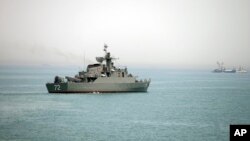The Saudi-led air campaign in Yemen is threatening to grow into a wider conflict as both the United States and Iran take new steps to potentially strengthen partners in the region.
U.S. defense officials announced Wednesday the U.S. has begun flying daily mid-air refueling missions for coalition planes taking part in airstrikes against Shia Houthi rebels. They said Washington also is expediting delivery of bombs and guidance kits to the Saudis and other coalition partners.
Meanwhile, Iranian state-run media Wednesday quoted Navy Commander Rear Admiral Habibollah Sayyari as saying Tehran was sending a naval destroyer and another vessel to the Gulf of Aden to protect the country's "interests in the high seas."
Iran has long been tied to Yemen’s Houthi rebels, although officials deny providing them with military support.
“The risk for escalation is pretty great,” a U.S. official told VOA on condition of anonymity. “It’s not surprising if Iran increases its support [for the Houthis] given the stakes.”
The impending presence of Iranian ships off the coast of Yemen already has the attention of U.S. defense officials.
“We certainly keep a close eye on all the naval activities in that region,” said Pentagon spokesman Col. Steve Warren. “We know the Iranians are partnered with the Houthis and they are working together.”
Warren said he had no evidence to this point that Iranian money and equipment have been delivered to the Houthis. U.S. counterterrorism officials have said previously there are no signs the Iranians are exercising command-and-control over the Houthis, although the links are clear between Tehran and Houthi leadership.
Former diplomats and officials also remain wary of Iran’s actions.
“They want to take over the region and take over as the regional superpower,” said former U.S. ambassador Mark Wallace, now CEO of the Counter Extremism Project, a non-profit international policy organization.




